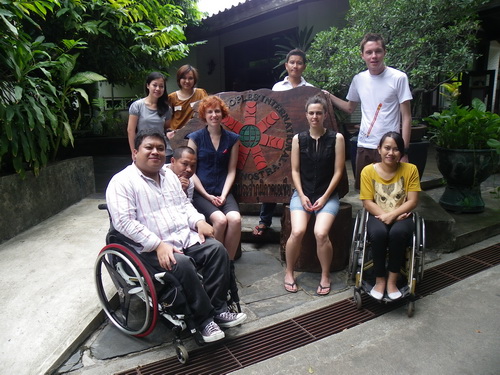DPI/AP Reports 2012
Disability Equality Training with Australian Youth Ambassadors for Development (AYAD) at DPIAP office

Monday 6th August 2012, DPIAP was weclcomed volunteers from Australia, to visit Disabled Peoples' International-Asia Pacific Regional Office (DPI/AP) to receive Disability Equality Training (DET) as the part of the strengthen skill for the volunteers before sending them to the working field. the volunteers will learing the movement of disability in nation level and regional level as DPIAP activities and partiicpate to DET, raising awareness and shifting ideas from Medical to Social Model perspective.
Three volunteers from Australia under the support of Australian Youth Ambassadors for Development (AYAD) Program came to visit Disabled Peoples’ International-Asia Pacific Regional Office (DPI/AP) to receive Disability Equality Training (DET) and learning Disability movement in Asais Pacific and in Thailand. The 2 hour trainging and disability movement presenting was review and given the background to young volunteers, as a part of the introduction to disability, raising awareness and shifting ideas from Medical to Social Model perspective. DPI/AP and Australian Youth Ambassadors for Development working together since several years and decided that the new volunteers should get this training to learn about DPI/AP work and disability.
The Australian Youth Ambassadors for Development program (AYAD) places skilled young Australian volunteers, aged 18-30, on short-term assignments of between 3-12 months, in developing countries throughout the Asia Pacific region. The program offers young people a wonderful opportunity to contribute to development while at the same time learning about other cultures. Youth Ambassadors work with Australian organisations and their overseas counterparts in a broad range of areas that include health, environment, rural development, gender, governance, justice, education and infrastructure development. Youth Ambassadors use their skills and expertise to actively contribute to international development. They gain an increased understanding of the development needs of Asia Pacific countries and broaden their experience by living and working in a cross-cultural environment.
International volunteering is based on reciprocal learning through commitment, engagement and solidarity contributes to such a world. International volunteers share their knowledge, experiences and skills as they live, work and learn in response to the needs expressed by local communities.
Author: DPIAP
Language: English
When: 6/8/2012
